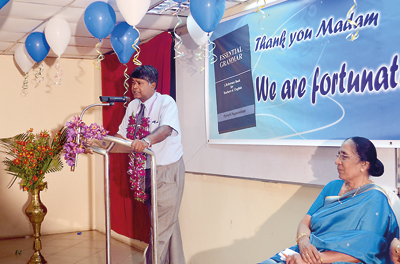You are currently browsing the tag archive for the ‘Parvathi Nagasunderam’ tag.

‘A Dance to the Music of Time’ by Antony Powell is one of the most impressive fictional works of the last century. The narrator comes across different characters in different settings over the years, and I was reminded of this as I saw so many old friends coming in here today to celebrate Parvathi Nagasunderam and her work.
I was delighted to see Prof Wilson, who was Dean of the Faculty of Arts at the University of Sri Jayewardenepura when Paru and I
began our work there, and was a tower of strength. Dinali Fernando was one of those we recruited along with Paru, and I also see here Madhubhashini Ratnayake, who is now at USJP, though I am sorry to say we did not succeed when we tried to recruit her then, way back in 1992.
I see Lakshmi Cumaranatunga, who headed the Higher Institute of English Education when Paru taught there, before we persuaded her to come to USJP. Then there is Prof Narada Warnasuriya, who was on the Academic Affairs Board of the National Institute of Education, when I chaired it in 2004. And I see students such as Lalith Ananda and Sarath Ananda and Palitha Dissanayake, whom Paru taught at the Pasdunrata College of Education, whom she introduced to the Asset Course I ran while at the British Council, and who subsequently joined either USJP or its Affiliated University Colleges when we began English courses there in revolutionizing English at universities.
And then there are Paru’s sisters, including the one I know best, Dr Fernando. When I say I know her, I should say that this is not directly, it is through her husband, Dr Joe Fernando, who was Secretary of the Ministry of Health, who was a constant visitor at my home because he lived nearby and would often drop in on my father during his relentless healthy walking round the block.
I discovered, in the dance of different characters to time’s music that we come across, that Joe was Paru’s brother-in-law. This happened because there was a news item, about 20 years ago, to the effect that the Secretary to the Ministry of Health had developed aids – which as we know from Joe’s continuing healthy walking, was not the case – and I mentioned this to Paru during one of the long journeys we would take together to the AUC at Belihuloya which later became Sabaragamuwa University. Paru laconically said that she would ask her sister, who was married to the Secretary.
I am delighted then to see Dr Mrs Fernando and another sister here, because I feel I know them well. They belong to a very distinguished family of educationists from Jaffna. I am sorry I never met Paru’s eldest sister, who was Principal of the Kopay Training College, though I did regularly meet the second, whom Paru looked after when she had to leave Jaffna after her elder sister’s death, since the family was then scattered far and wide.
I have not come here with a prepared text, because I wanted to see the type of audience there was before I spoke. The vast numbers of young people here, I am told, are Paru’s students from USJP and from Pasdunrata, and their presence here is a tribute to the deep devotion they feel towards her for her commitment to them. I thought therefore that I would talk about the challenges that Paru has faced, and how she has overcome them to move from strength to strength, in the hope that the range of her work will inspire these youngsters too to become teachers like her.



